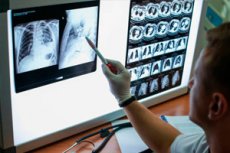New publications
Perioperative immune therapy improves survival in patients with lung cancer
Last reviewed: 02.07.2025

All iLive content is medically reviewed or fact checked to ensure as much factual accuracy as possible.
We have strict sourcing guidelines and only link to reputable media sites, academic research institutions and, whenever possible, medically peer reviewed studies. Note that the numbers in parentheses ([1], [2], etc.) are clickable links to these studies.
If you feel that any of our content is inaccurate, out-of-date, or otherwise questionable, please select it and press Ctrl + Enter.

Compared with preoperative (neoadjuvant) chemotherapy alone, the addition of perioperative immune therapy—before and after surgery—significantly improved event-free survival (EFS) in patients with resectable early non-small cell lung cancer (NSCLC), according to researchers at The University of Texas MD Anderson Cancer Center.
Results from the phase III CheckMate 77T trial were published in the New England Journal of Medicine. At a median follow-up of 25.4 months, the median EFS with chemotherapy alone was 18.4 months, while the median was not reached in patients receiving periperitoneal nivolumab, representing a significant prolongation of EFS compared with the control arm. These results correspond to a 42% reduction in the risk of disease progression, relapse, or death in those receiving the periperitoneal combination.
These data were first presented at the 2023 European Society for Medical Oncology (ESMO) Congress.
Key Results
Patients who received a perioperative nivolumab-based regimen also demonstrated significantly higher rates of pathological complete response (pCR), defined as no tumor at surgery, compared with those who received chemotherapy alone (25.3% vs 4.7%).
Rates of major pathological response (MPR), defined as ≤10% viable tumor cells at surgery, were also higher in patients receiving perioperative immune therapy (35.4% vs 12.1%).
Comments from leading researchers
"This study strengthens the standard of care for neoadjuvant chemoimmunotherapy and supports perioperative nivolumab as an effective approach to reducing the risk of lung cancer recurrence," said lead investigator Dr. Tina Cascon, associate professor of medical oncology, thorax/head and neck.
"These results add to the evidence that the perioperative immune therapy pathway gives patients with operable lung cancer the opportunity to live longer without their cancer returning."
Approximately 30% of patients diagnosed with NSCLC have resectable disease, meaning their tumor can be removed surgically. Although many of these patients can potentially be cured with surgery, more than half of them experience a recurrence of the cancer without additional therapy. Chemotherapy given before or after surgery provides only minimal survival benefit.
CheckMate 77T Study
The CheckMate 77T randomized, double-blind study, which began in 2019, enrolled more than 450 patients with NSCLC aged 18 years and older from around the world. Participants were randomized to receive either neoadjuvant nivolumab plus chemotherapy, followed by surgery and adjuvant nivolumab, or neoadjuvant chemotherapy and placebo, followed by surgery and adjuvant placebo.
Safety and side effects
The data showed no new safety signals with the perioperative nivolumab regimen and are consistent with the known safety profiles of the individual agents. Grade 3–4 treatment-emergent adverse events occurred in 32% and 25% of patients receiving the perioperative combination or control therapy, respectively. Surgery-related adverse events occurred in 12% of patients in both treatment groups.
These results complement the recent success of neoadjuvant nivolumab plus chemotherapy in NSCLC. In March 2022, the phase III CheckMate 816 trial led to FDA approval of nivolumab in combination with platinum-based chemotherapy.
"I am excited about the initial results of the study," Cascone said. "Going forward, it will be important to identify patient and disease characteristics that will tell us who could potentially be cured with neoadjuvant chemoimmunotherapy alone and who would benefit from more intensive treatment strategies."
